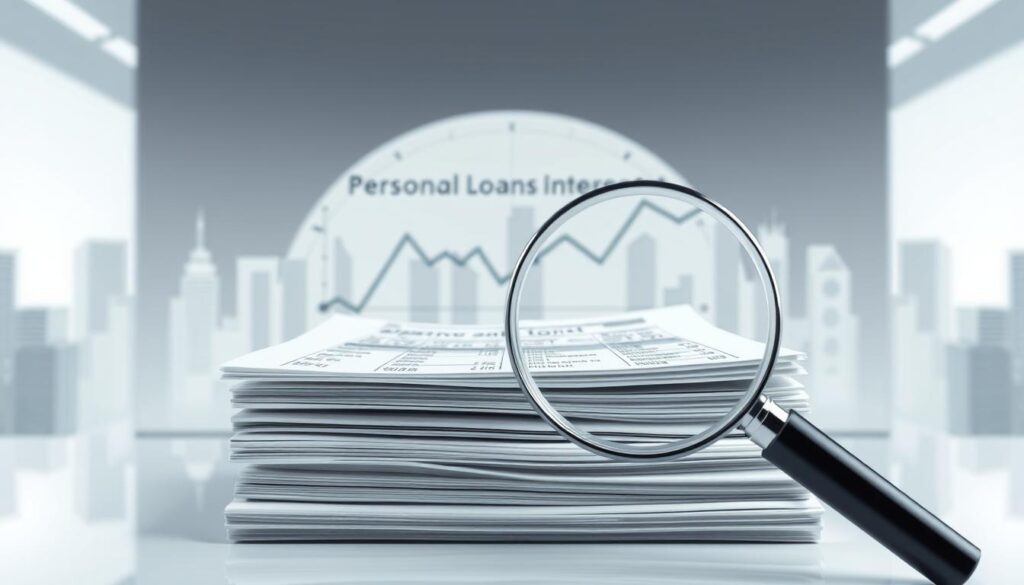Explore Personal Loan Options to Fit Your Budget
Did you know millions of Americans use loans each year? They do this to manage their money and reach their goals. Whether it’s paying off debt or buying something big, the right loan can really help.
Finding the right loan can seem hard, but it’s key to fit your budget and needs. There are many options out there. You can pick the one that works best for you.
Looking into different loan options lets you control your money. It helps you move closer to your goals.
Key Takeaways
- There are many loan options for different budgets and needs.
- Choosing the right loan can help you reach your financial goals.
- It’s important to carefully look at the options available.
- Loans can be used for many things, like paying off debt or buying big items.
- Knowing your financial needs is key to picking the right loan.
What Are Personal Loans?
Personal loans are a flexible financial tool. They can be used for many purposes. This gives people the financial freedom they need.
It’s key to know the basics of personal loans. Most are unsecured, meaning no collateral is needed. They usually have fixed interest rates and payments.
Definition of Personal Loans
A personal loan is a loan given by a lender for personal use. It’s often an unsecured loan, meaning no collateral is needed. The loan amount, interest rate, and repayment terms depend on the borrower’s credit and other factors.
As a financial expert notes, “Personal loans help cover unexpected costs or consolidate debt. They are a valuable financial tool.”
“The flexibility of personal loans makes them an attractive option for many borrowers.”
How Personal Loans Work
Personal loans give a lump sum of money to the borrower. The borrower then repays the loan, plus interest, over a set time. The repayment terms are usually fixed, helping with budgeting.
There are various types of personal loans, including secured and unsecured loans. Secured loans need collateral, while unsecured loans do not. Loans can also have fixed rates or variable rates, affecting the loan’s total cost.
| Loan Type | Collateral Required | Interest Rate |
|---|---|---|
| Secured Loan | Yes | Fixed or Variable |
| Unsecured Loan | No | Fixed or Variable |
Knowing these details about personal loans helps borrowers make better financial choices.
Types of Personal Loans
There are many types of personal loans out there. Each one is designed for different financial needs. It’s important to know what’s available to find the right one for you.
Secured vs. Unsecured Personal Loans
Personal loans can be either secured or unsecured. Secured loans need collateral, like a car or savings. If you can’t pay back, the lender can take the collateral.
Unsecured loans don’t need collateral. They’re based on how good your credit is. They usually have higher interest rates because they’re riskier for lenders.
Fixed-Rate vs. Variable-Rate Loans
Another key difference is between fixed-rate and variable-rate loans. Fixed-rate loans have the same interest rate for the whole loan term. This means your monthly payments stay the same.
Variable-rate loans have rates that can change with the market. This might make your monthly payments go up or down.
Debt Consolidation Loans
Debt consolidation loans help you combine several debts into one. This can lower your interest rate and make payments easier to manage.
These loans are great for people with high-interest debt, like credit card balances. They can help you pay off debt faster and save money on interest.
The Benefits of Personal Loans
Personal loans can help you reach your financial goals. They are great for unexpected costs, paying off debt, or big purchases. They provide the money you need.
Quick Access to Funds
Quick personal loans give you fast access to money. Many lenders have online apps and quick approvals. This means you can get the funds you need quickly, especially in emergencies.
Flexible Repayment Terms
Personal installment loans offer flexible repayment plans. You can pick a plan that matches your budget. This helps you manage your money better and avoid missing payments.
Boosting Your Credit Score
Regular, on-time payments on your personal loan can improve your credit score. Payment history is key to your score. Paying off your loan shows you’re responsible and can boost your score over time. For more on personal loans, check out Bankrate.
In summary, personal loans have many benefits. They offer quick access to funds, flexible repayment plans, and can help improve your credit score. By understanding these benefits and picking the right loan, you can have a positive borrowing experience.
Qualifying for a Personal Loan
To qualify for a personal loan, you need a good credit score, stable income, and a manageable debt-to-income ratio. Lenders look at these factors to decide if they should lend to you.
Credit Score Requirements
Your credit score is very important for getting a personal loan. A high score shows you handle debt well. Most lenders want a score of 700 or more. But, some might lend to people with lower scores.
What affects your credit score includes:
- Payment history
- Credit utilization
- Length of credit history
- Credit mix
- New credit inquiries
Income and Employment Verification
Lenders want to make sure you can pay back the loan. They check your job and how much you earn. They usually ask for:
- Proof of employment (e.g., letter from your employer)
- Recent pay stubs
- Bank statements showing regular income deposits
Having a steady job and income helps a lot when applying for a personal loan.
Debt-to-Income Ratio
Your debt-to-income (DTI) ratio is also important. It’s your total monthly debt payments divided by your income. A lower DTI means you can handle more debt.
Lenders like a DTI of 36% or less. But, some might accept higher ratios if your credit score and income are good.
Improving your credit score, income, and DTI can help you qualify for a personal loan. It’s smart to compare offers from different lenders to find the best deal for you.
How to Compare Personal Loan Options
Comparing personal loan options is key to making a smart choice that meets your financial needs.
Interest Rates and Fees
When comparing personal loans, interest rates and fees are crucial. Interest rates can greatly affect how much you’ll pay back. It’s important to know if the rate is fixed or variable and how it changes your monthly payments.
Also, look at the fees like origination fees, late fees, and penalties for paying off early. Some lenders might charge more fees to offer lower interest rates. To find the best deal, add up all the costs, including fees.
Loan Amounts and Terms
Lenders offer different loan amounts and terms. Finding a loan that fits your financial situation and repayment ability is essential. Think about whether you prefer a short-term loan with higher payments or a longer-term loan with smaller payments.
Also, consider the flexibility of the repayment schedule. Some lenders offer more flexible options than others.
| Loan Term | Monthly Payment | Total Interest Paid |
|---|---|---|
| 3 years | $300 | $1,500 |
| 5 years | $200 | $3,000 |
Lender Reputation and Customer Service
The lender’s reputation and customer service are also important. Research the lender’s reputation online, reading reviews and checking ratings with the Better Business Bureau or other regulatory agencies.
Good customer service is crucial if you run into problems with your loan. Look for lenders known for their helpful and responsive support.
By considering interest rates and fees, loan amounts and terms, and lender reputation and customer service, you can compare personal loans effectively. This way, you can choose the best option for your financial situation.
Common Uses for Personal Loans
Looking to fix up your home, cover medical bills, or just need some extra cash? Personal loans can help. They’re flexible and easy to get, making them a great option for many financial needs.

Home Improvements
Personal loans are often used for home improvements. Want a new kitchen or an extra room? A personal loan can help. Improving your home not only makes it better but can also raise its value. Loans let you pay over time, making it easier on your budget.
- Renovate your kitchen or bathroom
- Add an extra bedroom or living space
- Upgrade your home’s energy efficiency
Medical Expenses
Medical bills can surprise you and be hard to handle. A personal loan can be a big help. Whether it’s for a surgery or emergency care, loans can cover the costs. They can also make paying back easier by combining bills into one loan.
“Medical debt is a leading cause of financial hardship. Personal loans can offer a way to manage these expenses more effectively.”
Consolidating Debt
Got multiple debts? Merging them into one loan can be a smart choice. Debt consolidation means fewer payments and possibly lower interest. It’s key to shop around and understand the terms before you decide.
- Combine multiple debts into one loan
- Potentially lower your overall interest rate
- Simplify your monthly payments
Where to Get a Personal Loan
Personal loans come from many places, each with its own perks. Knowing the different lenders can help you choose wisely.
Traditional Banks
Traditional banks are a common choice for personal loans. They have various loan options with different rates and terms. The main advantage is you can manage your loan and other services in one spot. But, the process can take time, and the rules might be strict.
Credit Unions
Credit unions are owned by their members and offer loans. They often have better terms than banks, like lower rates and fewer fees. To get a loan, you usually need to join the credit union.
Online Lenders
Online lenders are popular for their ease and fast application. They have many loan options, and you can apply online. But, be careful of higher rates for those with lower credit scores.
| Lender Type | Interest Rates | Loan Terms | Application Process |
|---|---|---|---|
| Traditional Banks | Competitive, varies by bank | Flexible, up to several years | In-person or online, can be lengthy |
| Credit Unions | Generally lower than banks | Flexible, similar to banks | Typically in-person, membership required |
| Online Lenders | Varies widely, potentially higher | Flexible, often shorter terms | Entirely online, quick |
When picking a lender, think about your financial situation, credit score, and what you need. Each lender has its own pros and cons.
The Application Process Explained
Getting a personal loan involves several steps. We’ll cover them here. Knowing these steps helps you prepare and makes the process smoother.
Preparing Your Documentation
To apply for a personal loan, you need certain documents. These include income verification, identification, and proof of residence. Having these documents ready makes the application process easier.
- Pay stubs or income statements
- Driver’s license or passport
- Utility bills or lease agreement
Organizing these documents helps you apply efficiently.
Submission Steps
The way you submit your application can differ. But most lenders follow a similar path. You can start online or in person. Here’s a general guide to the submission steps:
- Fill out the application form with your personal and financial details.
- Submit the required documents.
- Wait for the lender to review your application.
Make sure your information is accurate to avoid delays.
What to Expect After Applying
After you apply, the lender will check your details. This can take a few hours to several days. Here’s what you can expect:
- A review of your credit score and history
- Verification of your income and employment status
- A decision on your loan application
If approved, you’ll get the loan details. This includes the loan amount, interest rate, and repayment terms. Review these details carefully before accepting the loan.
Understanding Personal Loan Interest Rates
It’s key to understand personal loan interest rates to make smart money choices. The rate you get can change how much you pay each month and the loan’s total cost.
Personal loan rates vary based on your credit score, loan length, and the lender’s rules. A high credit score can lead to lower rates. A longer loan term might lower monthly payments but raise the total interest over time.

Factors Affecting Interest Rates
Several things affect the interest rate on a personal loan. Your credit score is a big one, showing lenders if you’re reliable. Other factors include your income, job history, debt-to-income ratio, and loan size.
Lenders also look at the economy and how risky lending to you is. For example, when the economy is shaky, they might raise rates to protect themselves.
How to Secure a Lower Rate
Getting a lower interest rate can save you a lot of money. One way is to boost your credit score. Pay bills on time, cut down debt, and avoid new credit checks.
Another tactic is to compare rates from different lenders. Online lenders, credit unions, and traditional banks have different rates. Look around and consider shorter loan terms or debt consolidation to get a better rate.
Managing Your Personal Loan Responsibly
Handling your personal loan wisely is crucial to avoid financial trouble. It’s important to manage your loan well. This means using strategies to keep up with payments and keep your finances healthy.
Creating a Repayment Plan
To manage your loan well, start by creating a realistic repayment plan. First, look at your income, expenses, and other financial duties. This will help you figure out how much you can pay each month.
A good repayment plan should list the loan amount, interest rate, term, and monthly payment. Don’t forget to include any fees. These should be part of your plan too.
| Loan Amount | Interest Rate | Loan Term | Monthly Payment |
|---|---|---|---|
| $10,000 | 6% | 5 years | $193.79 |
| $20,000 | 8% | 7 years | $310.62 |
| $30,000 | 10% | 10 years | $395.94 |
Making Extra Payments
Making extra payments can help you pay off your loan faster. This also means you’ll pay less interest over time. Even a little extra can make a big difference.
Before making extra payments, check with your lender. Make sure there are no penalties for early payment. If there aren’t, use any extra money to pay down your loan.
Avoiding Default
Avoiding default on your loan is key to keeping your credit score high and avoiding extra fees. If you’re struggling, talk to your lender. They might offer help like temporary payment breaks or changing your loan terms.
Also, check your budget to see where you can cut costs. This can help you have more money for your loan payments. Making your loan payments a priority can keep you on track and prevent default.
Pitfalls to Avoid with Personal Loans
Personal loans can be helpful if used wisely. But, making mistakes can cause problems. It’s key to know the risks that could harm your finances.
Overborrowing
Overborrowing is a big risk with personal loans. It happens when you borrow more than you can pay back. To avoid this, check your finances well. Think about your income, expenses, and debts before borrowing.
Ignoring the Fine Print
Another mistake is ignoring the fine print of your loan. Lenders often add fees and conditions that can change the loan’s cost. To avoid surprises, read and understand your loan agreement well. Look closely at interest rates, repayment terms, and extra fees.
Missing Payments
Missing payments can hurt your credit score and finances. To avoid this, make a budget that puts loan repayment first. Set up automatic payments to never miss a payment. If you’re struggling, talk to your lender about options like hardship programs or restructuring your loan.
Knowing these risks and taking steps to avoid them can help you manage your loan well. This keeps your finances healthy.
FAQs About Personal Loans
We’ve looked into personal loans and now answer some common questions. Knowing these details can help you choose the right financial option.
Average Interest Rate on Personal Loans
The interest rate on personal loans changes based on your credit score, loan amount, and who you borrow from. Rates usually fall between 6% and 36%. If you have good credit, lenders like LightStream and Discover might offer you a better rate.
Paying Off a Personal Loan Early
Pay off your loan early to save on interest. First, check if there’s a penalty for early payment in your agreement. Many lenders, like SoFi and Marcus, don’t charge penalties for early repayment.
Impact of Applying for a Personal Loan on Credit Score
Applying for a loan might lower your credit score a bit, but only temporarily. This is because of the hard inquiry. But, paying on time can boost your score over time. Lenders like Wells Fargo and Bank of America report your payments to credit bureaus.
FAQ
What is the average interest rate for a personal loan?
Can I pay off my personal loan early?
Will applying for a personal loan affect my credit score?
What are the credit score requirements for a personal loan?
Can I get a personal loan with bad credit?
How long does it take to receive funding after applying for a personal loan?
Can I use a personal loan for debt consolidation?
What is the maximum loan amount I can borrow with a personal loan?
What is the average interest rate for a personal loan?
Can I pay off my personal loan early?
Will applying for a personal loan affect my credit score?
What are the credit score requirements for a personal loan?
Can I get a personal loan with bad credit?
How long does it take to receive funding after applying for a personal loan?
Can I use a personal loan for debt consolidation?
What is the maximum loan amount I can borrow with a personal loan?
FAQ
What is the average interest rate for a personal loan?
Personal loan interest rates vary. They depend on your credit score, loan term, and the lender. Rates usually fall between 6% and 36% APR.
Can I pay off my personal loan early?
Yes, paying off your loan early is a good idea. It can save you money on interest. But, check with your lender first to avoid any penalties.
Will applying for a personal loan affect my credit score?
Applying for a loan might lower your credit score temporarily. This is because of the hard inquiry on your report. Yet, making timely payments can improve your score over time.
What are the credit score requirements for a personal loan?
Lenders have different credit score needs. A score of 700 or higher is usually considered good. But, some lenders offer loans even with bad credit, at higher rates.
Can I get a personal loan with bad credit?
Yes, we offer loans even with bad credit. Rates might be higher, though. We look at your income and job history too, not just your credit score.
How long does it take to receive funding after applying for a personal loan?
Funding times vary. But, we usually see it within a few days to a week after approval. Some online lenders offer quick funding options.
Can I use a personal loan for debt consolidation?
Yes, personal loans are great for debt consolidation. They can simplify your finances and save you money on interest. We offer loans with competitive rates for this purpose.
What is the maximum loan amount I can borrow with a personal loan?
Loan amounts differ by lender. We see them from
FAQ
What is the average interest rate for a personal loan?
Personal loan interest rates vary. They depend on your credit score, loan term, and the lender. Rates usually fall between 6% and 36% APR.
Can I pay off my personal loan early?
Yes, paying off your loan early is a good idea. It can save you money on interest. But, check with your lender first to avoid any penalties.
Will applying for a personal loan affect my credit score?
Applying for a loan might lower your credit score temporarily. This is because of the hard inquiry on your report. Yet, making timely payments can improve your score over time.
What are the credit score requirements for a personal loan?
Lenders have different credit score needs. A score of 700 or higher is usually considered good. But, some lenders offer loans even with bad credit, at higher rates.
Can I get a personal loan with bad credit?
Yes, we offer loans even with bad credit. Rates might be higher, though. We look at your income and job history too, not just your credit score.
How long does it take to receive funding after applying for a personal loan?
Funding times vary. But, we usually see it within a few days to a week after approval. Some online lenders offer quick funding options.
Can I use a personal loan for debt consolidation?
Yes, personal loans are great for debt consolidation. They can simplify your finances and save you money on interest. We offer loans with competitive rates for this purpose.
What is the maximum loan amount I can borrow with a personal loan?
Loan amounts differ by lender. We see them from $1,000 to $50,000 or more. We have options for both small and large loans, based on your needs and credit.
Can I get a personal loan from an online lender?
Yes, we work with online lenders. They offer loans with good rates and flexible terms. It’s wise to compare rates and terms from different lenders to find the best one for you.
How do I manage my personal loan responsibly?
To manage your loan well, make a repayment plan and pay on time. Avoid default. You can also make extra payments to pay off your loan early and save on interest.
,000 to ,000 or more. We have options for both small and large loans, based on your needs and credit.
Can I get a personal loan from an online lender?
Yes, we work with online lenders. They offer loans with good rates and flexible terms. It’s wise to compare rates and terms from different lenders to find the best one for you.
How do I manage my personal loan responsibly?
To manage your loan well, make a repayment plan and pay on time. Avoid default. You can also make extra payments to pay off your loan early and save on interest.









